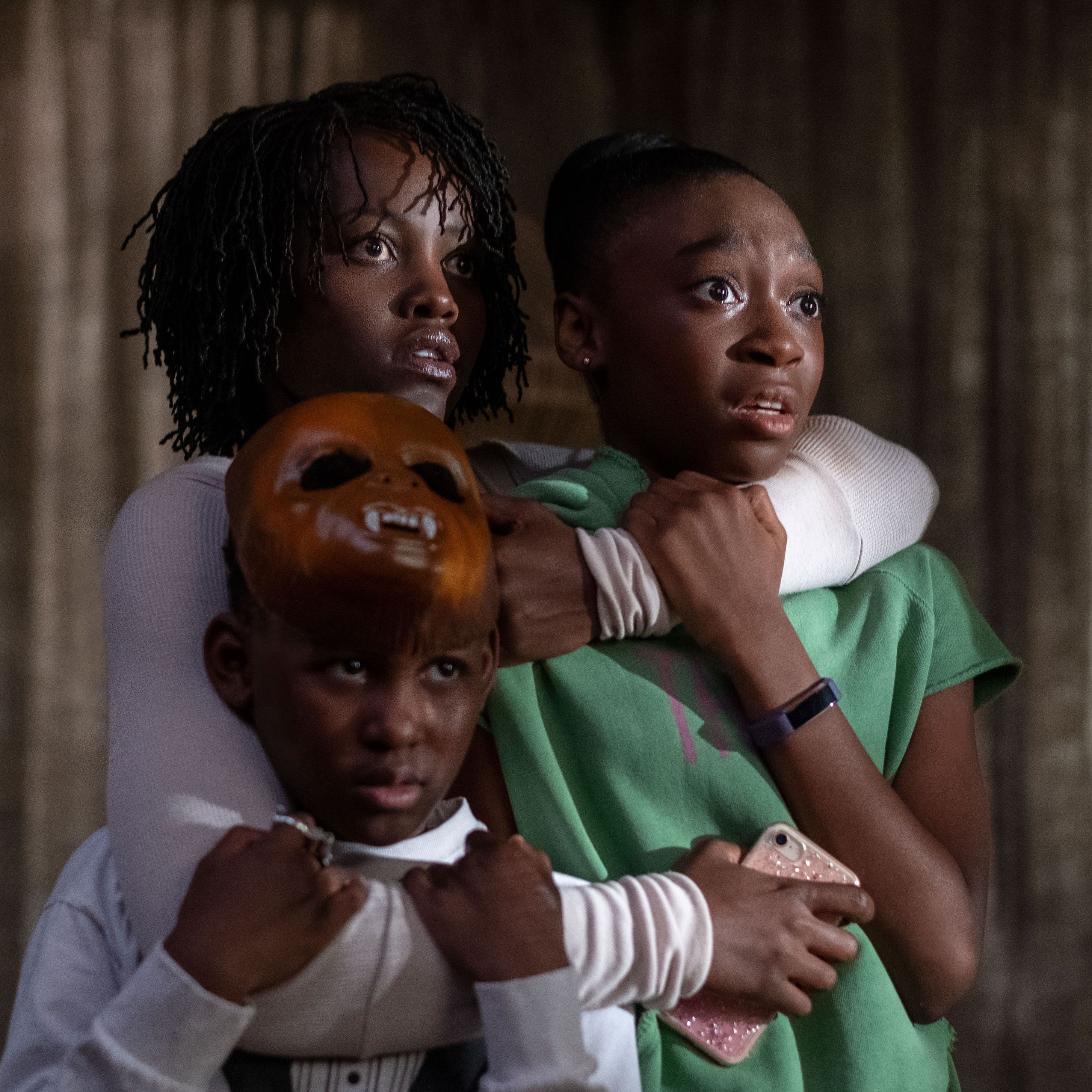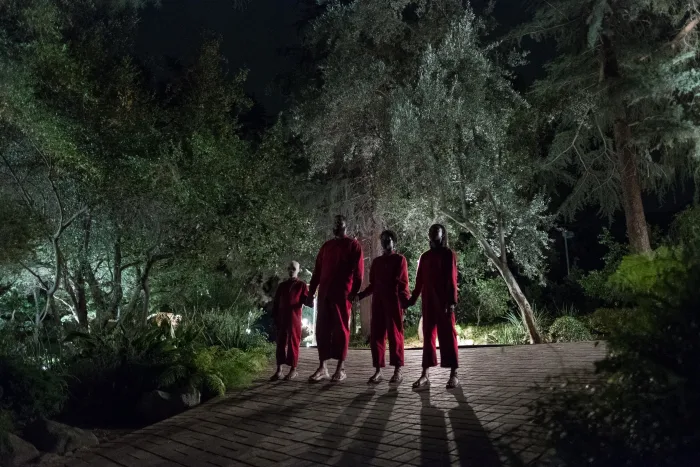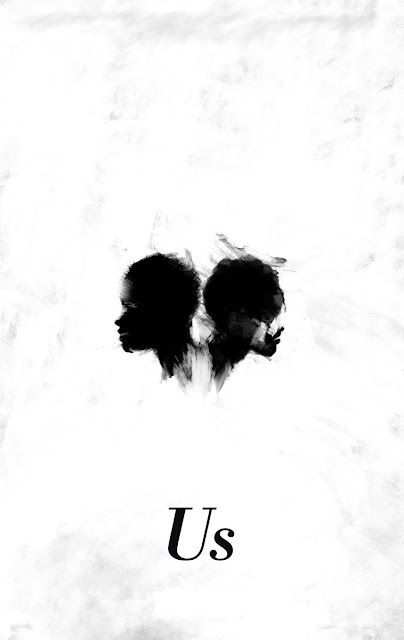Us Film Review
Through The Rabbit Hole
Admittedly, while the majority of my higher education as a college and University student involved me learning and being engrossed in different histories and theories of film, if there's one cinematic genre that I'm personally not acquainted with, it's the horror genre. As much as I've seen interesting horror flicks in recent time which viscerally apply camera or sound formalities in a unique way - whether it's through the hypnotic-scream of Mandy, the tense and quiet A Quiet Place or the atmospheric It Follows - my knowledge and self-application in viewing features of similar ilk isn't as established as others, but I'm getting there. One of the main reasons as to why I'm not as familiar with this said genre is through my introduction to these films; how the horror films that I initially got introduced to (aside Alien) never were enticing and generally mimicked one another through stale jolts of the camera or off-pace comical gestures. In many ways, it was tiresome to view and fathom these films since it was hard to accept the constructs that made a horror feature in the first place; how the aspects that were presented were formulaic and boring. Alongside those aforesaid titles that had me enthused with the horror genre, so to did Jordan Peele's latest horror follow-up from his debut of Us, an ambiguous and inventive horror entry from an up-and-rising director that clearly understands and appreciate's the cinematic aspects at this disposal...
In order to get away from their busy lives, the Wilson family takes a holiday to Santa Cruz, California with the plan of spending time with their friends, the Tyler family. On a day at the beach, the Wilson's youngest song Jason almost wanders off, causing his mother Adelaide to become not only protective of her family, but paranoid of past traumas that have lingered with her ever since she was a child. Later that night, four mysterious people break into the Wilson's family home. However, upon the strangers' intrusion, the Wilson's are shocked to notice that the intruders look exactly like them, but only with grotesque body and facial features. Naturally terrified of this shocking occurrence, what does this mean for the Wilson family and what is it that these doppelgangers want?...
 Following on from his rightfully acclaimed directorial debut success of Get Out, which not only naturally gained prestige in earning an Academy Award for Best Original Screenplay but is seen as a staple for how contemporary horror films should be crafted, Jordan Peele's latest film-making continuation in Us equally bestows to its audiences an air of eeriness which is distinctively projected through the use of formatic approaches. Indeed, whether it's the effective use of artificial and/or natural lighting which fittingly manipulates the given space to the haunting sound design which effortlessly provides this overwhelming sense of uneasiness and ambiguity, it's clear to fathom just how much Peele as a film-maker wholly understands the horror genre archetypes and when to appropriately use a specific technique at the right time, unlike some others. However, before properly delving into the formatic aesthetics which Peele and his film-making team have perfectly used in tangent with the performances of Lupita Nyong'o and Winston Duke especially, what's imperatively commendable to firstly state in relation to Us is Jordan Peele's application in outdoing his previous directorial endeavour of Get Out. As much as it can be argued that both of Peele's films each exhibit different themes and motifs, with Get Out metaphorically commentating on the ignorance and attitude of racism which rather fuels the horror of the story and how Us uses the contextual aspect of creepy doppelgangers as an allegory for how we may view other people and recognise the enemy and our darkest selves, what's imperative to perceive in both Peele's films so far is his continuity in not only using the same intriguing methodology, but also how both films makes the audience want to talk; whether it's about the story or the suggested themes. Despite rightfully receiving praise and recognition for his artistry in making Get Out which subsequently received nominations and rewards, it's pleasing to see through viewing Us that Peele hasn't changed his style and hasn't become a pretentious version of what he was doing so well from the beginning. The only difference to palpably view is how much more haunting Us to the more socially disclosed Get Out, which is even better. For those who are acutely attuned to the horror genre, there's no room for disappointment since there's a plethora of blood, kills and twists that leave you engaged to where the story and inevitable outcome in going. As much as the different formal factors of cinematography, lighting and sound significantly contribute to Us's likeability as a great contemporary horror flick, what's equally as imperative to note is the said films distinctive approach in showcasing a context that is pleasingly original and oddly inviting thanks to the way in which certain story elements are presented. As highlighted, the film in question can be interpreted in so many different ways, but its the manner in which Peele presents certain things in an obvious or ambiguous fashion which instigates these many different points of view. In a way, it's as if Peele wants to give us his material to make cinema-goers properly think and reflect on our attitude and how to feel our way through some of the darker sides of the human condition. For sure, it's definitely a film that, on second viewing, you're going to appreciate more since you'll nice the subtle imagery and symbolism of a few aspects that relate to the outcome, but that's a great thing. It's the best feeling when a film 'evolves' through different viewings and ideas and Us is a modern example of this. Another thing that Peele perfectly gets across is the placement of the comedy and how it never begrudgingly puts you off from the horror and characterisation that subsequently follows. If there's one slight construct that I personally resent in seeing any particular horror films, it's the inclusion of a comical gesture where a character pauses through tense circumstance and says something. To put it simply, it's lazy screenwriting whenever this happens. Yet, in having an established comical background, Peele correctly knew when to approximately insert a quip; whether it's a physical/body gesture or when Winston Duke's character funnily says a remark. While both the story and the messages it emphasises were really engaging and entertaining to watch and ponder long after the viewing, if there's on discrepancy to be had with the film it's manner in which certain story details are blatantly revealed to us, rather than leaving these plot-points in an air of uncertainty. As much as it doesn't necessarily hinder the films credibility, it's a minute thing that would have been better if what was left to interpretation, similar to how Us exhibits a multitude of different thematics.
Following on from his rightfully acclaimed directorial debut success of Get Out, which not only naturally gained prestige in earning an Academy Award for Best Original Screenplay but is seen as a staple for how contemporary horror films should be crafted, Jordan Peele's latest film-making continuation in Us equally bestows to its audiences an air of eeriness which is distinctively projected through the use of formatic approaches. Indeed, whether it's the effective use of artificial and/or natural lighting which fittingly manipulates the given space to the haunting sound design which effortlessly provides this overwhelming sense of uneasiness and ambiguity, it's clear to fathom just how much Peele as a film-maker wholly understands the horror genre archetypes and when to appropriately use a specific technique at the right time, unlike some others. However, before properly delving into the formatic aesthetics which Peele and his film-making team have perfectly used in tangent with the performances of Lupita Nyong'o and Winston Duke especially, what's imperatively commendable to firstly state in relation to Us is Jordan Peele's application in outdoing his previous directorial endeavour of Get Out. As much as it can be argued that both of Peele's films each exhibit different themes and motifs, with Get Out metaphorically commentating on the ignorance and attitude of racism which rather fuels the horror of the story and how Us uses the contextual aspect of creepy doppelgangers as an allegory for how we may view other people and recognise the enemy and our darkest selves, what's imperative to perceive in both Peele's films so far is his continuity in not only using the same intriguing methodology, but also how both films makes the audience want to talk; whether it's about the story or the suggested themes. Despite rightfully receiving praise and recognition for his artistry in making Get Out which subsequently received nominations and rewards, it's pleasing to see through viewing Us that Peele hasn't changed his style and hasn't become a pretentious version of what he was doing so well from the beginning. The only difference to palpably view is how much more haunting Us to the more socially disclosed Get Out, which is even better. For those who are acutely attuned to the horror genre, there's no room for disappointment since there's a plethora of blood, kills and twists that leave you engaged to where the story and inevitable outcome in going. As much as the different formal factors of cinematography, lighting and sound significantly contribute to Us's likeability as a great contemporary horror flick, what's equally as imperative to note is the said films distinctive approach in showcasing a context that is pleasingly original and oddly inviting thanks to the way in which certain story elements are presented. As highlighted, the film in question can be interpreted in so many different ways, but its the manner in which Peele presents certain things in an obvious or ambiguous fashion which instigates these many different points of view. In a way, it's as if Peele wants to give us his material to make cinema-goers properly think and reflect on our attitude and how to feel our way through some of the darker sides of the human condition. For sure, it's definitely a film that, on second viewing, you're going to appreciate more since you'll nice the subtle imagery and symbolism of a few aspects that relate to the outcome, but that's a great thing. It's the best feeling when a film 'evolves' through different viewings and ideas and Us is a modern example of this. Another thing that Peele perfectly gets across is the placement of the comedy and how it never begrudgingly puts you off from the horror and characterisation that subsequently follows. If there's one slight construct that I personally resent in seeing any particular horror films, it's the inclusion of a comical gesture where a character pauses through tense circumstance and says something. To put it simply, it's lazy screenwriting whenever this happens. Yet, in having an established comical background, Peele correctly knew when to approximately insert a quip; whether it's a physical/body gesture or when Winston Duke's character funnily says a remark. While both the story and the messages it emphasises were really engaging and entertaining to watch and ponder long after the viewing, if there's on discrepancy to be had with the film it's manner in which certain story details are blatantly revealed to us, rather than leaving these plot-points in an air of uncertainty. As much as it doesn't necessarily hinder the films credibility, it's a minute thing that would have been better if what was left to interpretation, similar to how Us exhibits a multitude of different thematics.  |
| "And to think, if it weren't for you...I never would've dance at all." |
As mentioned in the preceding paragraph, one of the more imperative reasons as to why Jordan Peele's Us works better as a horror films than his directorial debut of Get Out is thanks to the said films formalities. One of the things to remember of great horror films of recent memory and of the past are there efforts in establishing a mise en scène and sound (whether it's diegetic or non-diegetic) that not only seems visceral and alarming to the point where your point of view troubled by the events, but are filmic devices which elude to a greater and realistic sense of apprehension. It's these horror films, like The Shining or The Exorcist, which seemingly do this and make us remember them long after. Even if we don't remember every minute detail from every sequence, there's always on particular shot or scene that lingers in our minds and Us works in the same ilk. Whether it's through the of harsh lighting and projected shadows to distort the given reality of space or the impeccable sound design, brilliantly composed by Michael Abels by the way, which rather appropriately toys with our emotions and expectancy of subsequent events, the execution of all these formalities within Us is perfectly done and never once feels distastefully out of place. The composed music especially significantly adds to Peele's attemptive ambiguity and the creepiness of the situation which the Wilson family are faced with when they're face to face with their doppelgangers. By all means, just like how you can recognise the likes of Jaws and Psycho in terms of their infamous musical scores, Us's specific score of 'Anthem' (the opening composed musical piece of the film) will stand the test of time from my own perspective.
However, as much as the given formalities on display significantly elaborates on Peele's pursuit of visceral dubiousness, much of this is complimented by the central performances of the Wilson family; more specifically Lupita Nyong'o's enactment of the awed Adelaide. Although this may seem like an overstatement, considering what films and roles this aforesaid actress has done and been a part of, this is arguably Nyong'o's best performance of her career as an actress so far and an enactment that sticks out more than most others in recent years. To not only standout out of the frame in being a seemingly all-assured American mother and having the traumatic complications that the character possesses, but to also portray a chilling counterpart as well in a clearly contrasting and damning way through the use of a raspy voice and a maniacal stare is nothing short of impressive. Much of the same can be seen through the rest of the Wilson family. Winston Duke, proving his Black Panther scene-stealing was no fluke, is significantly relatable as the goofy Gabe; with one-liners and remarks that pleasantly coincides with the strangeness of the situation he and his family are in. Mind you, he's not half imposing as his scary double of Abraham either! Shahadi Wright Joseph's insidious-esque smile as daughter Zora's evil other will also undoubtedly torment you when going to bed...
Considering what has been achieved through the many different and wonderful aspects that make-up Us, I think it's fair to assert the notion that his directorial debut of Get Out wasn't a one-off and that Jordan Peele is an inspiring dream-weaver who comprehensibly understands the delicacies of the horror genre. Indeed, the comedian-turned-director's second filmic entry signifies Peele's assurance as film-maker and how capable he is to stick to his own methodology and exploit significant and prominent sub-texts. Not only Peele uphold a methodically thematical view in similar vein to the likes of David Cronenberg and George Romero, but his control in implementing the frame to an appropriate tone, just as John Carpenter and Dario Argento both did, emphasises just how much of a visionary Peele really is. In regards to Us, it's a contemporary horror which diligently illuminates its distinctive context through gaudy uses of cinematography and lighting. Similar to what I said of Denis Villeneuve when discussing Blade Runner 2049 at the time of that films release, I can't wait to see what Jordan Peele has next in his filming armoury...
On that note, it's time for me to end this week's Film Review. As always everyone, thank you for reading my latest Film Review of Jordan Peele's Us and if anyone happens to have an opinion on my review or on the film itself, you're more than welcome to share your thoughts down below. For next week, I'll be continuing on with my Star Wars Film Review series by discussing Attack of the Clones...Possibly my least favourite of the whole franchise! 😐 With that said, thank you once again for reading my latest Blog entry and I hope you're all having a nice Easter!! Adieu! 😃😧😱😈👪👥
★★★★★ - Alex Rabbitte



Comments
Post a Comment